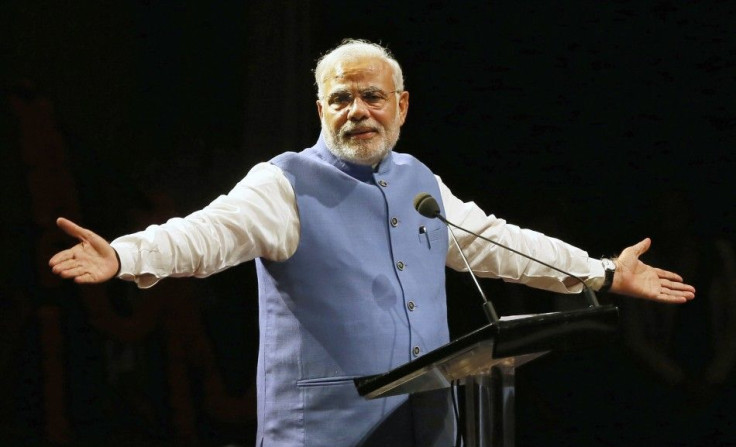India PM Narendra Modi Voted TIME ‘Person of the Year,’ Ferguson Protesters Finish Second

Indian Prime Minister Narendra Modi seems to be all set to be declared as the winner of TIME magazine's "Person of the Year" by online voting. He appears to be well ahead of Ferguson protestors who stand second in the poll.
Modi, who has just completed six months as the prime minister of India, got 16.2 percent votes while Ferguson protestors got 9.2 percent. The voting closed at midnight on Dec. 6. The result of the people's choice is going to be officially declared on Dec. 8. While the final choice of the TIME Person of the Year is decided by its editors, the readers are given an opportunity to give their opinion about the choice. TIME conducted the voting with Pinnion, an audience response company. Readers were asked to vote on its website. At the same time, readers were also able to cast their vote on social networking websites like Twitter and Facebook with the hashtag #TIMEPOY.
Modi had a landslide victory earlier this year while it was the first time in 30 years that India had a party, which formed the government with singular majority. The Bharatiya Janata Party's leader is, however, a highly controversial figure. He is appreciated for his economic policies especially in the Indian state of Gujarat where he created a high economic growth during his tenure as the chief minister. At the same time, he has been blamed for not doing enough for human development in the state.
The most controversial event during his tenure as the chief minister was the 2002 communal riots which reportedly killed 790 Muslims and 254 Hindus. There were 2,500 people non-fatally injured and 223 more went missing. Modi is often accused of playing an outside role in inciting the violence. The US Department of State allegedly banned Modi from traveling to the United States due to his alleged role in the attacks. Modi was, however, allowed visa after he had become the prime minister. He recently visited the United States and Australia where he received a glorious response from the local Indians. India Today earlier reported that U.S. President Barack Obama called Modi a "man of action" who had shaken up India's "bureaucratic inertia."
Top ten voted names in the TIME Person of the Year include 18-year-old Hong Kong student activist Joshua Wong (3rd position with 7% votes), the youngest Nobel Peace winner Malala Yousafzai (4th position with 4.9% votes) and Ebola Doctors and Nurses (5th position with 4.5% votes). Vladimir Putin (6th position with 4.3% votes) beat U.S. President Barack Obama who stood 11th in the list with 2.2% votes.
Ferguson Protestors, standing second on the list, do not have a single face to represent it unlike Joshua Wong, who is the face of the pro-democracy protests in Hong Kong. It is an interesting co-incidence that Wong became one of the top three contenders for TIME Person of the Year on Dec. 6, the same day he ended his hunger strike due to health issues. CNN reported that that Wong's strike had lasted for 108 hours. The Ferguson Protest, though a continuous process since Afro-American teenager Michael Brown was fatally shot by a policeman on Aug. 9, became a sensation on Nov. 24 when the grand jury decided not to indict the policeman. The protest, both peaceful and violent on occasions, is believed to be symbolic against police injustice against public.
Here is the complete list according to the individual position in the list:
- Narendra Modi (16.2%)
- Ferguson Protestors (9.2%)
- Joshua Wong (7%)
- Malala Yousafzai (4.9%)
- Ebola Doctors and Nurses (4.5%)
- Vladimir Putin (4.3%)
- Laverne Cox (3.4%)
- Joko Widodo (2.7%)
- Pope Francis (2.6%)
- Chibok Girls (2.5%)
- Barack Obama (2.2%)
- Beyoncé (2.1%)
- Jennifer Lawrence (2%)
- Angela Merkel (1.8%)
- Taylor Swift (1.7%)
- John Oliver (1.6%)
- Elon Musk (1.6%)
- Tim Cook (1.5%)
- Elizabeth Warren (1.4%)
- Pete Frates and Pat Quinn (1.3%)
- Hillary Clinton (1.2%)
- Christopher Nolan (1.2%)
- Shonda Rhimes (1.2%)
- Xi Jinping (1.2%)
- Jack Ma (1.2%)
- Bashar al-Assad (1.1%)
- Tom Frieden (1.1%)
- Dilma Rousseff (1.1%)
- Recep Tayyip Erdogan (1%)
- Reed Hastings (1%)
- Janet Yellen (1%)
- Jeff Bezos (1%)
- Kim Kardashian (1%)
- Kanye West (1%)
- Benjamin Netanyahu (0.9%)
- Hassan Rouhani (0.9%)
- John Kerry (0.9%)
- Rand Paul (0.8%)
- Abdel Fattah el-Sisi (0.8%)
- Thomas Piketty (0.7%)
- Ayatollah Ali Khamenei (0.7%)
- Mary Barra (0.7%)
- Abu Bakr al-Baghdadi (0.6%)
- Travis Kalanick (0.6%)
- Rick Perry (0.6%)
- Ted Cruz (0.5%)
- Charles and David Koch (0.4%)
- Harvey Levin (0.4%)
- Mitch McConnell (0.4%)
- Roger Goodell (0.3%)
Contact the writer: s.mukhopadhyay@ibtimes.com.au




















